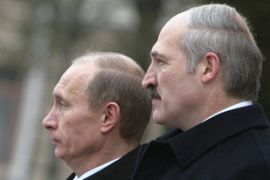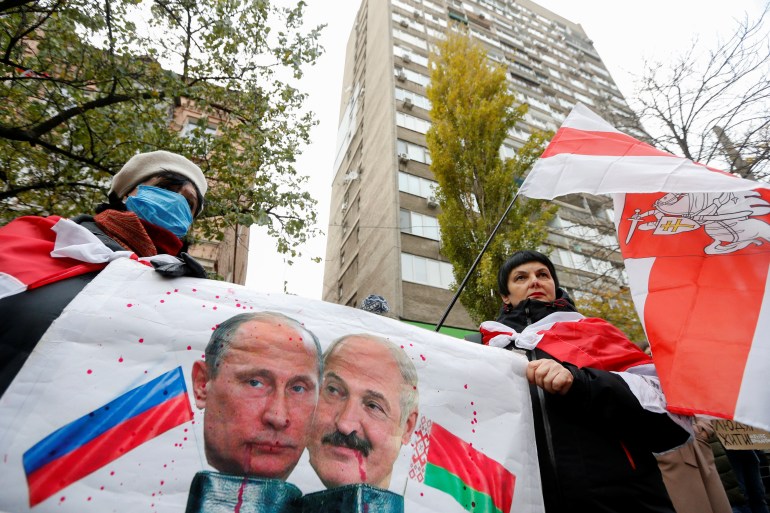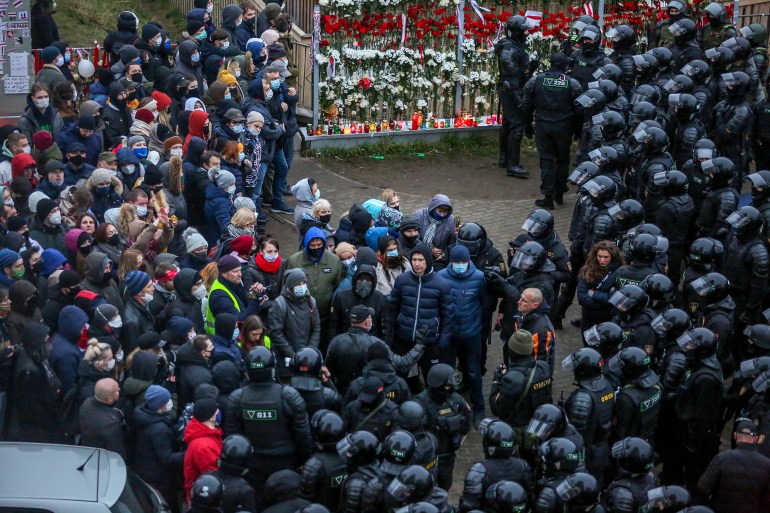Russia, Belarus celebrate ‘unity’ as war grinds on in Ukraine
The ex-Soviet allies have grown closer during the war and Lukashenko’s dalliances with the West appear to be over, say analysts.

On Sunday, Minsk and Moscow will mark a day of unity, remembering when in 1996, Belarusian President Alexander Lukashenko and then-Russian president Boris Yeltsin signed a treaty aimed at forming a Union State of the two Slavic neighbours.
Some proposals, like a shared currency, never took off, but the Union State became the basis for a gradually deepening cooperation.
Keep reading
list of 4 itemsBelarus arrests Russian separated from daughter over sketch
Criticism of Russia, Belarus return to sport ‘deplorable’: IOC
Belarus might host strategic nuclear weapons, says Lukashenko
While Belarus also seemed interested in relationships with the West, that changed in 2020, when Moscow came to Lukashenko’s rescue.
The moustachioed leader had faced huge anti-government street protests. Russia said it was ready to send in troops, to support the crackdown on dissent. In the end, no Russian troops were involved, but the offer went some way in quelling the uprising.
Over the last year, as Russia has pummelled Ukraine, Belarus has stood loyally by Russia’s side and recently agreed to host Russian tactical nuclear weapons – a sign of stronger ties.
Landlocked and sandwiched between Russia, Ukraine, Lithuania and Poland, Belarus became independent with the collapse of the Soviet Union in 1991.
Three years later, Alexander Lukashenko, a once-radical and reforming Soviet deputy, came to power.
His tenure has arguably been a throwback to the Soviet past, with Belarus maintaining a largely state-run, centralised economy and a tightly controlled society.
Long nicknamed “Europe’s last dictator”, Lukashenko has led the country uninterrupted for almost 30 years.
For much of his time in office, he has tried to maintain sovereignty and by extension, his own power. But in recent years, and especially since the war in Ukraine, he has been growing closer to Russia.
“Lukashenko has built his regime through fear and repression against dissenters, gradually depriving citizens of freedom of speech and right to express political opinion,” Belarusian researcher Alesia Rudnik told Al Jazeera.
“However, the largest wave of repression started following the large-scale protests in 2020.”
Mass protests against Lukashenko
Three years ago, mass protests erupted after Lukashenko declared himself the victor in the election, winning more than 80 percent of the popular vote – a majority the opposition thought was unlikely.
There were widespread reports of torture as security forces suppressed the rallies.
The 68-year-old has not always seen eye-to-eye with Moscow, however, and during the protests, even accused Russia of sending mercenaries to overthrow him.
But spurned by Europe over allegations of human rights abuses and emboldened by Russian President Vladimir Putin’s moral support, Lukashenko moved closer to the Kremlin.

“Prior to the protests in 2020, Lukashenko and his regime were attempting to maintain the balance between Russia and the West,” Rudnik continued. “The Western window has been completely shut for now and the stance towards Russia has shifted into the direction of looking at the [Russian] regime as the guarantor of Lukashenko’s stability.”
Although Minsk’s foreign policy generally follows Moscow’s lead, Lukashenko had tried to keep his options open with the West, as well.
He had invited Western observers to military exercises held with Russia and rolled out visa-free travel for Western citizens.
In 2019, he even eyed closer ties with NATO.
But in 2021, after the protests, he firmly threw his lot in with the Kremlin by claiming that Crimea, the peninsula that Moscow annexed from Ukraine in 2014, was Russia’s territory.
“Lukashenko signed an agreement with Russian President Boris Yeltsin to create a political and economic union between the two countries,” Tatsiana Kulakevich, a Belarusian academic at the University of South Florida, told Al Jazeera.
“The agreement was never fully implemented. However, Belarus’s integration with Russia has deepened considerably since 2020, when Russian President Vladimir Putin promised assistance to aid the harsh crackdown on large-scale election protests in Belarus. Lukashenko’s acceptance of Russian assistance, as well as constant lobbying by Belarusian diaspora and [opposition leader] Sviatlana Tsikhanouskaya for the West’s support against Lukashenko, marked a turning point in his attempts to balance between East and West.”
Evolution of a union state
The Union State project, even if not realised in full, had a few perks.
In 2014, a customs union meant Belarusian smugglers could help Russia evade Western sanctions by importing goods such as Italian cheese and reshipping them to Russia as “Belarusian parmesan”, with no checks.
After the anti-Lukashenko protests, the Union State process accelerated.
Most important was military cooperation. In the run-up to Russia’s invasion of Ukraine last year, tens of thousands of Russian troops were deployed to Belarus under the guise of “training exercises”.
Like NATO, since 2010, Russia’s official military doctrine considers an attack on one member of the Union State an attack on them both, and promises to respond accordingly.
While Minsk has not actively taken part in the invasion, it was a staging ground for the war and there have been reports of Russian missiles fired from Belarusian territory and wounded soldiers being treated in Belarusian hospitals.
In response, Belarus has been hit with sanctions, cutting it off from the European economy.
Still, Lukashenko has said Belarusian soldiers will not join the fray.
“Belarus cannot spare the troops,” Kulakevich said. “A majority of the troops who serve in the Belarus army are conscripts doing compulsory military service.
“Also, any Belarusian troops sent to Ukraine would rely on the Russian command infrastructure [and] losing control is not in Lukashenko’s interests.”
A small cadre of highly trained, special forces troops are unlikely to be deployed to Ukraine either, Kulakevich added, since Lukashenko needs them to suppress domestic unrest.
Still, there are other ways Belarus can prove a useful ally to Russia.
In February, after a referendum widely suspected to be rigged, Belarus announced it was scrapping its commitment to staying nuclear-free, paving the way for Russian atomic armaments to be stationed there.
This month, Putin announced he would station nuclear warheads in Belarus, responding to the United Kingdom sending depleted uranium rounds to Ukraine.

“Of course, Russia has a huge influence on the Belarusian authorities and society,” said Danila Lavretski, general secretary of the opposition movement Youth Bloc Belarus.
“Political integration within the framework of the so-called ‘Union State’ directly contradicts the Belarusian constitution and, together with [other] factors, may lead to a situation where the independence of Belarus will remain only nominal.”
Belarus lacks the kind of nationalism that has defined much of Ukraine’s recent history.
But in recent years, the demand for “Belarusian nationalism” has grown in society, he told Al Jazeera.
“The Lukashenko regime not only systematically destroyed democratic institutions, but also contributed to the decline of Belarusian self-identity. Since 1994, the number of Belarusian-language schools has decreased, the Russian language has been adopted as the second state language, and the previous state symbol, the white-and-red flag, was replaced by the Soviet one and instead became a symbol of the opposition.”
As in Russia, a number of Belarusians also protested against the war in Ukraine. There were 800 arrests on the night of February 27 last year, at rallies in solidarity with Ukraine.
“For the Belarusian opposition, the beginning of the war became an opportunity to mobilise both their supporters and ‘wavering’ citizens,” said Lavretski. “There is a consensus in the Belarusian society rejecting the war as a phenomenon in general, and even more so a war with the participation of the Belarusian people.”
Although most Belarusians still tended to think positively towards Russia, society has become more polarised; many view Lukashenko as little more than Putin’s puppet.
“Targeting his own population after 2020, Lukashenko shot himself in the foot and has no longer leverage on Putin as he remains his only close and strong political ally,” said Rudnik.